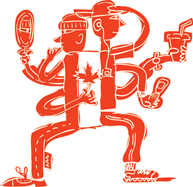POV
Experiential consumerism
Canadians are bifurcating: The same consumer is shopping at both Wal-Mart and Holt Renfrew. We want the cheap and cheerful promise of the Wal-Mart experience but we also like to go more upscale for some items. We want to be financially sensible for some items, but we also feel we deserve some spoiling - we've earned it!

Tzigane
This appears to be true not just in the upper- and middle-income brackets but also at lower-income levels. The fascinating thing is, this phenomenon is also creeping into more mundane categories.
Canada has evolved from a commodities economy to a manufacturing economy to a services economy, and now to an experience economy.
Retailers are being forced to change the way they market to match their audience. No longer can a company succeed simply by offering a dissimilar product: they have to offer an actual experience that is memorable and pleasurable to the consumer.
We would bet that your favourite retailer provides a distinctive experience. Whether on entering the store, while scanning the aisles or menu board, or after making the purchase, you will find a unique set of services and an overall experience geared to attracting and maintaining brand loyalty.
Consumers like feeling that they are in charge. They like knowing that the store and its employees genuinely care about them and value their spending. Consumers also like getting a value greater than its cost. Providing service value, personnel value, image value and, consequently, a greater overall shopping experience adds to customer satisfaction while carrying less cost to the retailer.
Starbucks demonstrates this shift in retail focus. The coffee behemoth has attracted more than just upper-class consumers with the overall experience that its consumers take away from it. This experience is highlighted by the brand image, personnel and services value it provides to its customers. Starbucks actively promotes its social-value initiatives, which feed the feeling of goodwill that its customers attain.
But is it not just at the high end. We are seeing this also occurring at the mid-range and lower price points. For example, Winners is a store that offers a "low price point," but many shoppers enjoy the "thrill of the hunt" and snagging the bargain they can boast about. We agree that many will go to Wal-Mart for low prices. But our lives are often more subtle and complex than that. We also crave experience when we can afford it, or sometimes even when we can't - witness the enormous consumer debt in the U.S. and Canada.
In this type of economy, those who neglect change are left in the shadows. Shopping at the Bay is, for many, no longer a desirable experience. The department store model has become obsolete, largely due to the impersonal sales staff and bland atmosphere.
Loblaws is facing an extraordinarily capable competitor in the grocery business - Wal-Mart. What Loblaws must do to stay competitive is something similar to Air Canada's approach to low-cost competitor, WestJet. Air Canada admits that it cannot match WestJet's costs, so Canadians must willingly pay more to fly on Air Canada because of the Air Canada experience: flight frequency, Aeroplan miles and upgrades to business class that they can't get at WestJet. The equivalent for Loblaws is the President's Choice brand, superb produce and, above all, a more pleasant shopping experience.
This experience-oriented economy will continue indefinitely. Retailers must succumb to the psyche of consumers, and we Canadian consumers are a demanding lot.
Karl Moore is an associate professor of management and associate professor of neurology at McGill. Matthew Hertz is a Bachelor of Commerce student at McGill, majoring in finance.
A version of this piece appeared in the December 27 Globe and Mail.

